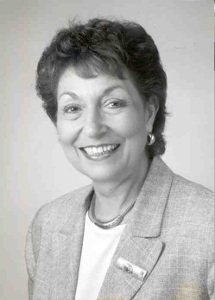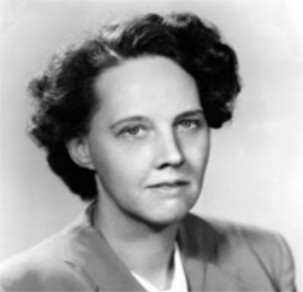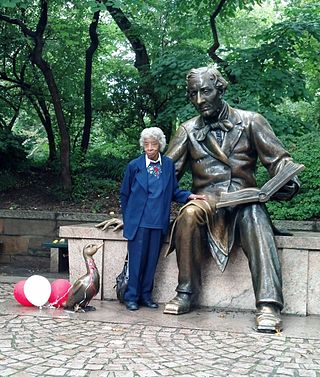The American Library Association (ALA) is a nonprofit organization based in the United States that promotes libraries and library education internationally. It is the oldest and largest library association in the world, with 49,727 members as of 2021.

Judith Fingeret Krug was an American librarian, freedom of speech proponent, and critic of censorship. Krug became director of the Office for Intellectual Freedom at the American Library Association in 1967. In 1969, she joined the Freedom to Read Foundation as its executive director. Krug co-founded Banned Books Week in 1982.

Elonnie J. Josey was an African-American activist and librarian. Josey was the first chair of the Black Caucus of the American Library Association, having been instrumental in its formation in 1970; served as president of the American Library Association from 1984 to 1985; and was the author of over 400 books and other publications.

Banned Books Week is an annual awareness campaign promoted by the American Library Association and Amnesty International, that celebrates the freedom to read, draws attention to banned and challenged books, and highlights persecuted individuals. Held during the last full week of September since 1982, the United States campaign "stresses the importance of ensuring the availability of those unorthodox or unpopular viewpoints to all who wish to read them" and the requirement to keep material publicly available so that people can develop their own conclusions and opinions. The international campaign notes individuals "persecuted because of the writings that they produce, circulate or read." Some of the events that occur during Banned Book Week are The Virtual Read-Out and The First Amendment Film Festival.
The American Association of School Librarians (AASL) is a division of the American Library Association (ALA) that has more than 7,000 members and serves primary school and secondary school librarians in the U.S., Canada, and even internationally. Prior to being established in 1951, school librarians were served by the School Library Section of ALA founded in 1914, which emerged from the Roundtable of Normal and High School Librarians. The mission of the American Association of School Librarians is to empower leaders to transform teaching and learning.
Margaret Hayes Grazier was an American librarian, educator, and published author in the field of Library and Information science, who specialized in school librarianship. She worked as a school librarian at various high schools and, later in her career, as a professor of library science at Wayne State University. Grazier had developed a model to guide library media specialists to become fully immersed in the entire cycle of the student's learning process, everything from storytelling to planning and evaluating curriculum. She was active in several important library organizations, including the American Library Association, and received awards for her contributions to her field of study.

Frances E. Henne was an American librarian. Henne pursued a life of education and became a leader and expert in creating standards for school librarians. In 1999, American Libraries named her one of the "100 Most Important Leaders We Had in the 20th Century."

Clara Stanton Jones was the first African-American president of the American Library Association, serving as its acting president from April 11 to July 22 in 1976 and then its president from July 22, 1976 to 1977. Also, in 1970 she became the first African American and the first woman to serve as director of a major library system in America, as director of the Detroit Public Library.

Henrietta M. Smith was an American academic, librarian and storyteller, who edited four editions of the Coretta Scott King Award collection published by the American Library Association. In 2008, she was honored with the Association for Library Service to Children (ALSC) Distinguished Service Award, which recognizes significant contributions to library service to children and ALSC. She is also the recipient of the 2011 Coretta Scott King-Virginia Hamilton Award for Lifetime Achievement for her body of work as a significant and lasting literary contribution. She was honored during the 2014 Carle Honors Celebration by the Eric Carle Museum of Picture Book Art for her life's work as a champion of diversity in children's literature.
Intellectual freedom encompasses the freedom to hold, receive and disseminate ideas without restriction. Viewed as an integral component of a democratic society, intellectual freedom protects an individual's right to access, explore, consider, and express ideas and information as the basis for a self-governing, well-informed citizenry. Intellectual freedom comprises the bedrock for freedoms of expression, speech, and the press and relates to freedoms of information and the right to privacy.
Librarianship and human rights in the U.S. are linked by the philosophy and practice of library and information professionals supporting the rights enumerated in the Universal Declaration of Human Rights (UDHR), particularly the established rights to information, knowledge and free expression.
The Freedom to Read Foundation (FTRF) is an American non-profit anti-censorship organization, established in 1969 by the American Library Association. The organization has been active in First Amendment-based challenges to book removals from libraries, and in anti-surveillance work. In addition to its legal work, the FTRF engages in advocacy and public awareness, such as its sponsorship of the annual celebration of "Banned Books Week".

Sari Feldman is an American librarian. Sari was president of the American Library Association (ALA) from 2015 to 2016. During her presidency, she launched the Libraries Transform public awareness campaign that increased funding support for libraries and sought to advance information policy.

Barbara Stripling is an American librarian and is the President of the Freedom to Read Foundation, a non-profit legal and educational organization affiliated with the American Library Association. Stripling served as president of the American Library Association from 2013 to 2014. During her term as president, she stressed that "Libraries Change Lives."

Tommie Dora Barker was an American librarian and founding dean of Emory Library School in Atlanta, Georgia. She also served as a regional field agent, representing southern libraries, for the American Library Association.

Julius C. Jefferson Jr. is an American librarian who was president of the American Library Association for the 2020-2021 term. In 2022 President Joe Biden appointed him to the National Museum and Library Services Board which advises the agency on general policies with respect to the duties, powers, and authority of the Institute of Museum and Library Services relating to museum, library, and information services, as well as the annual selection of National Medals recipients.Jefferson is additionally a section head of the Congressional Research Service at the Library of Congress, and served as the president of the Freedom to Read Foundation from 2013 to 2016.

Wallace Van Jackson was an American librarian and civil rights activist. He was the director of several academic libraries over his career and was respected for developing collections that promoted the history of African Americans; he was also instrumental in creating reference services and building library collections for multiple libraries in Africa. Van Jackson was part of a group that successfully challenged voter discrimination against African Americans in 1944 in Atlanta, Georgia.

The Alabama Library Association (ALLA) is a professional organization for Alabama's librarians and library workers. It is headquartered in Montgomery, Alabama. It was founded on November 21, 1904, in Montgomery. Thomas Owen, director of the Alabama Department of Archives, was the association's first President from 1904 through 1920.
Mary Hellen Maher (1913-1998) was an American librarian known for her work in school libraries. She was active in state and national library and education associations. She served as president of the New York Library Association in 1950. Throughout her career Mahar wrote about and implemented her philosophy of the importance of instructional materials in student learning. Mahar believed that professional librarians must do everything possible to meet individual needs. and that school librarians must eschew a reputation for only organizing, housing, and circulating books.

Lucille Cole Thomas was an American librarian. Thomas had a long career supporting library services for children with the New York City Board of Education. She was the first African American president of the New York Library Association. She also served as president of the International Association of School Librarianship and the American Association of School Librarians.